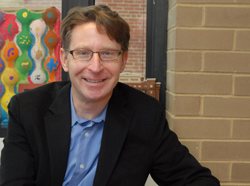GW MEMSI in the news
New GW Institute Brings Together Scholars in Medieval, Early Modern Studies
 |
|
Jeffrey J. Cohen, chair of GW’s English Department, leads the University’s Medieval and Early Modern Studies Institute. |
By Julia Parmley
Faculty across departments in GW’s
Columbian College of Arts and Sciences have been individually engaged in medieval and early modern
scholarship for years. But now their expertise has a home in GW’s newly created Medieval and Early Modern
Studies Institute (MEMSI).
The first major humanities initiative funded under the University’s Research Enhancement Fund, MEMSI brings
together faculty and students in history, English, French and Italian to foster new research, exchange ideas and strengthen partnerships between GW and other scholarly organizations. MEMSI scholars are engaged in myriad topics of study spanning the sixth to 18th centuries, including community formation, violence and cultural differentiation, consumption and trade, and the interactions among Christians, Jews and Muslims.
The institute is also supported by faculty and scholars from American University,
Georgetown University, George Mason University, the Folger Shakespeare Library,
the Shakespeare Theatre and the University of Maryland.
“We wanted to create a structure in which everyone, from advanced scholars to
undergraduates, could form a community and create cutting-edge scholarship that
will change the way we think about the past,” says Jeffrey J. Cohen, chair of GW’s
English Department and MEMSI director.
In fall 2007, Dr. Cohen says he and other interested faculty members organized
seminars around medieval and early modern studies that garnered a “fantastic”
response and made clear the need for an institute housed at GW. Last November, more than 60 scholars from GW and major universities nationwide attended MEMSI’s first event, a symposium titled“Touching the Past.” In January, MEMSI received its official charter and has been hosting seminars, lectures and events ever since, including supporting the Shakespeare Association of America’s annual conference in April. “The energy that has come out of the seminar has kept going,” says Dr. Cohen.
“By its nature, scholarly research and work in medieval and early modern studies is
interdisciplinary,” says Associate Professor of History Marcia Norton, who joined
MEMSI at its inception. “The institute also allows local scholars to come together
around common interests.”
MEMSI’s 10 core faculty members meet twice a semester for discussion and planning and often invite each other to give talks to classes and groups. Recent publications from participating faculty members include Dr. Cohen’s book about England’s
multiethnic past titled Cultural Diversity in the British Middle Ages: Archipelago, Island, England; Dr. Norton’s book on tobacco and chocolate in the early modern Spanish Atlantic world titled Sacred Gifts, Profane Pleasures; and Professor of English
Jonathan Gil Harris’s Untimely Matter in the Time of Shakespeare, which explores material objects and their meaning in Renaissance drama.
Dr. Cohen says there has been significant undergraduate participation in the seminars
and lectures and says MEMSI is an especially helpful model for graduate students of how to conduct scholarship. “Too often, scholars practice as isolated individuals and are needlessly competitive,” says Dr. Cohen. “It can be eye-opening for graduate students to see that there can be a community of experts who collaborate like this.”
MEMSI’s goals include fostering partnerships with local institutions, presentations of undergraduate research and raising the University’s research profile in the field. “We have a world-class faculty here at GW in medieval and early modern studies,” says Dr.
Cohen. “With MEMSI, we now hope to form a community that advances their research
and adds to GW’s prestige.”
Dr. Cohen also stresses that the issues of the medieval and early modern era remain relevant to today’s world. “In many ways we are still haunted by events that occurred during the time period,” he says. “For example, we are still dealing with issues of race, community formation and cultural competition. When we study the past attentively, we look at our own times differently.”
